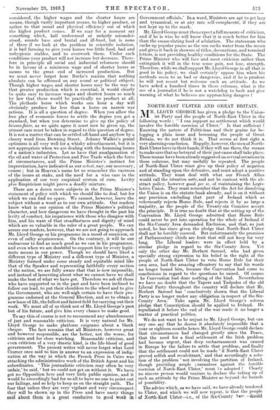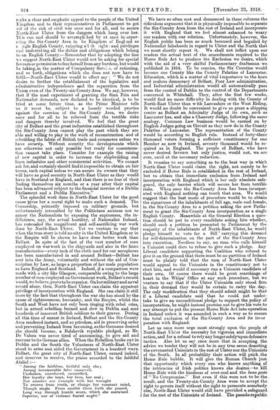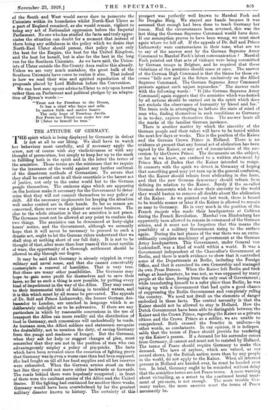NORTH-EAST ULSTER AND GREAT BRITAIN.
MR. i LLOYD GEORGE has given a pledge to the Union- .1.. Party and the people of North-East Ulster in the following words : "I can support no settlement which would involve the forcible coercion of Ulster." Is that sufficient ? Knowing the nature of Politicians and their genius for be- fogging a plain issue and bemusing the people of Great Britain, we do not think it is. That seems at first sight a very alarming conclusion. Happily, however, the men of North- East Ulster have in their hands, if they will use them, the means to make sure that no betrayal of their just cause shall take place. These means have been already suggested on several occasions in these columns, but may usefully be repeated. The people of North-East Ulster must give up their policy of negation and of standing upon the defensive, and must adopt a positive attitude. They must deal with what our French Allies would call the situation nette, and not be content with the ab- stract policy, however good per se, of maintaining the Legis- lative Union. They must remember that the Act for dissolving the Union is on the statute-book already, and is on it without any provision excluding that part of Ireland which as vehemently rejects Home Rule, and rejects it by as lane a majority, as the people of the Twenty-six Counties accept the principle. It is true no doubt that at the setting up of the Convention Mr. Lloyd George admitted that Home Rule could never be put into operation for the whole of Ireland if the Six-County Area demanded Exclusion, and that, as just noted, he has since given the pledge that North-East Ulster shall not be forcibly coerced. But unfortunately the promises of Parliamentary chiefs are fruit that will not keep for very long. The Liberal leaders were in effect held by a similar pledge in regard to the Six-County Area. Yet only the other day Mr. Herbert Samuel, who had given specially strong expression to his belief in the right of the people of North-East Ulster to veto Home Rule for their own area, had the amazing effrontery to say that his words no longer bound him, because the Convention had come to conclusions in regard to the questions he raised. Of coarse he Convention had done nothing of the kind. Nevertheless we have no doubt that the Tapers and Tadpoles of the old Liberal Party. throughout the country will declare that Mr. Herbert Samuel has 'conclusively shown that the Liberal Party is no longer under any obligation in respect of the Six- County Area.' Take again Mr. Lloyd George's solemn pledge that Conscription should be applied to Ireland. He repudiated it before the end of the war made it no longer a matter of practical politics.
We do not want to be unjust to Mr. Lloyd George, but can any one say that he deems it absolutely impossible that a year or eighteen months hence Mr. Lloyd George could declare that circumstances had changed greatly since the Peace, that the need for a final settlement of the Irish problem had become urgent, that deep embarrassment was caused in Europe by the failure to settle that problem, and finally that the settlement could not be made 'if North-East Ulster proved selfish and recalcitrant,' and that accordingly a solu- tion of the problem 'not involving the partition of Ireland, though providing ample f.,uarantees against the forcible coercion of North-East Ulster,' must te adopted ?Clearly no sincere person would venture to declare the taking up of such an attitude by the Prime Minister as beyond the bounds of possibility. The advice which, as we have said, we have already tendered to Ulster, and which we will now repeat, is that the people of North-East Ulster—i.e., of the Six-County UN: --..thould make a dear and emphatic appeal to the people of the United Kingdom and. to their representatives in Parliament to .get id of the risk of civil war once and, for all, and to secure, North-East Ulster from the dangers which hang over her. This can and should be accomplished by at once imorpor- sting the Six-County Area in he Kingdom of Englind as a ;ngle English 'County, enjoying all th iigh.t; and privileges and undertaking all the duties and obligations which belong to an English Cou.n_ty.—Remember that by adopting the line we suggest North-East Ulster would not be asking for special favours or permission to free herself from any burdens, but would be , taking, in the matter of Compulsory 'Service, of rationing, and so forth, obligations which she does.. notnow have to fulfil.—North-East Ulster would in effect say : "We do not desire- to further the establishment of the legislative and, administrative independence and the separation from the Union even-of the Twenty,six-County Area. We say, however, that if the mad, experiment of granting the Sinn Fein and Nationalist demands, now declared to be identical, is to be tried at some future time, as the Prime Minister tells us it must be, subject to a loosely worded proviso against the coercion of the Six-County Area, we desire once and. for all to be relieved, from the terrible, risks and. dangers thereby involved. We feel that the great city of Belfast and the great industries established throughout the Six-County' Area cannot play the .part which they are able and willing 'to play in the work of reconstruction: and of rebuilding. the fabric of British trade an.dcommerce unless we have security. Without security the developments. which, are otherwise not only possible but ready for consumma- tion cannot take_ place. Consider for example the raising of new capital- in order to increase the shipbuilding: and linen industries.and other commercial activities.. We .cannot ask for, ahd certainly should find it impossible to obtain _on. fair, terms, such capital unless we can assure its owners that they will have as good security in North-East Ulster as they. would. have in Scotland or England, and that there is no fear of their finding themselves six months or a year. after their capital has been advanced subject to the financial mercies of a Dublin Parliament and a Dublin Executive."
The splendid work done in No]lth-East. Ulster for the good. cause gives her a moral right to make such a demand. The Censorship, primarily imposed on military grounds, but unfortunately intensified by the . Politicians anxious not to annoy the Nationalists by exposing _the supineness, the. in- difference nay, the actual hostility, of Nationalist Ireland, has concealed the magnificent . and . self ,sacrificing. war work done by North-East Ulster. Yet we venture to say that when the true story is told no city in the United Kingdom-or. in the Empire will be shown to .have done better work than Belfast. In spite .-of the fact of the vast .number of men employed on war work in the shipyards and also in the linen manufactories,--every inch of the. cloth used for our aeroplanes has been manufactured in and around Belfast—Belfast has sent into the Army, voluntarily and without the aid of Con- scription by Law, as large a proportion of her.male population as have England and Scotland: Indeed, if a comparison were made with a city like Glasgow comparable owing to the large number of men employed on Government work Belfast's record. would, we believe, prove to be superior. On her military and naval record alone, then, North-East Ulster can claim the apparent privilege of incorporation with England. She can claim it still. more by the fact that throughout the war she has stood by the cause of righteousness, humanity; and the Empire, whilst the South and West lave not only been ringing. with.,rebel cries, but in armed- rebellion, burned .and. slew in Dublin ond, sent hundreds of innocent British soldiers to their graves. During all this time of unrest in 'Ireland, Belfast and the Six-County Area rendered instant, and so priceless, aid in preserving order and preventing. Ireland from becoming, ,as the Germans desired she should become; a Bolshevik republic pledged, as Mr. De Valera was never . tired of announcing, ,,to give aid. and succour to its German allies. When the Rebellion broke out in Dublin. and the South. the -Volunteers of North-East Ulster. stood to arms and _aided. the- Government in a hundred ways.- Belfast, the great city of North-East Ulster, earned indeed, and deserves to receive, the praise accorded to the faithful Abdiel :— •
" Among the faithless, faithful only she ; Among innumerable false, unmoved, Unshaken, unseduced, unterrified,.
Her loyalty- she. kept, her -love, her zeal;, Nor number nor example with her wrought To swerve from truth, or change.. her constant mind, Though single. From amidst them forth she passed, Long way through hostile scorn, which she sustained--
superior, nor- of violence feared aught." We have so often met and denounced in these columns the ridiculous argument that it is physically impossible to separate the Six-County Area from the rest of Ireland and incorporate it with England that we feel almost ashamed to weary our readers. with our solution.. Unfortunately, however, the English public has been so much .bemused,- and beguiled by Nationalist falsehoods in regard to Ulster _and the North that we must shortly repeat it. We . shall not inflict upon our readers the actual text of the. amendments. required to the Home Rule Act to produce the Exclusion we desire, which with the aid of a very skilful Parliamentary, draftsman' we published in 1914. To be -concise, the Six Counties would become one County like the County Palatine of Lancaster. Education, which is a matter of vital importance to the keen. andzealous democracy. of Belfast, Poor Law administration, and Industrial administration wmild all automatically. pass from the control of Dublin, to .the control of the Departments concerned in Whitehall. They, after the flint few, weeks,. would find no more .difficulty in dealing with the Count of North-East Ulster than with Lancashire or _the West Riding. It would no doubt be convenient to give so great a. shipping centre as Belfast an Admiralty Judge of its-- own, . such as Lancaster has, and also a Chancery Judge, following :the same analogy. Common Law business would, be :carried on. by English Judges.. going on Circuit as they now do in the County Palatine' of . Lancaster. The representation of the County' would be according. to English rule. Instead . of • forty-three thousand voters forming a, sufficient constituency for one Member as now in Ireland, seventy thousand would be -re- quired as. in England. The people of Belfast; who have never- desired. favours but only justice, would not,. we are sure, cavil at the necessary reduction.
It remains to say something. as to ;the. best way in .which . North-East Uleter could claim the. right, not .merely_ to, be excluded if Home Rule is established an:the rest. of. Ireland, but to obtain that immediate exclusion- from. Ireland and incorporation with England .which is her only -abeolnte, safe- guard, the only.' barrier, which_ will secure her: from terrible risks. When once the Six-County Area has beenincorpor- ated with England nothing can touch that area,. We would suggest that the beat mode of procedure would .be to, obtain the signatures of the inhabitants of full age, male and. feniale, in. the Six-County Area to a . petition asking the .new Parlla- ment to grant the Six-County Area incorporation. as a single English County. Meanwhile at .the General Election a queri- tion.should.. be put to every candidate asking him. whether, should such a- petition be presented.: to Parliament by the majority of the inhabitants of North-East Ulster, he, would pledge himself to vote for a Bill* carrying this demand . for self-determination on the part of the Six-County Ares into execution, Needless to say, no man . who calls himself a Unionist could dare to refuse to give such a pledge. Any Liberal candidate supporting the Coalition who, refused to give it on the ground that there must be no partition of Ireland must be plainly told: that the men of North-East Ulster would appeal to the Unionists in the constituency not to elect him, and would if necessary run a Unionist. candidate.of their own. Of course there would be- great searchinge; of heart in the Whips' Office at any such . procedure, but . we venture to say that if the- Ulster Unionists. only stood, firm in their: demand they would be certain to . carry the, day. The only modification that they should .admit might be that' if a Liberal candidate said that he could not under, take to eve an unconditional 'pledge to support the- policy of incorporation, he might instead promise not to eve his vote to any attempt to put the present, Home Rule Act into operation in- Ireland unless it was amended in such a way as to ensure the total exclusion of the Six-.County Area and its iticor poration with England.
Let us once more urge most strongly upon the people of North-East Ulster the necessity for vigorous _and. immediate action, and. for a refusal to rely any longersolelrupon defensive tactics. Also .let us say once -more . that- in :accepting . the advice we tender they-will not be in any true sense, deserting the covenanted Unionists in the-rest of Ulster northaUnionists of the, Sou.th. In all . probability their. action. will prick. the Home Rule bubble, It will give the Roman . Church. just that. opportunity which every - one who knows anything of the intricacies of Irish . politics knows she desires—to kill Home Rule with the kindness-of over-zeal and the beau goste of " No Compromise," But even. if this were not -to be.the result, and the Twenty-six,- County Area were to accept the right to govern itself without the right to persecute somebody else, North-East Ulster would still have provided, a safeguard, for the rest of the. Unionists of Ireland.. The ,psendozepublic of the South and West would never dare to persecute the Unionists within its boundaries -whilst North-East Ulster as a part of England remained, as she would remain, vigilant to :bang any act of Nationalist oppression before the :Imperial Parliament. No one who has studied the facts and truly appre- ciates the situation can doubt for a moment that instead of .there being any selfishness in the policy which we desire .that North-East Ulster should pursue, that policy is not only the • best for the Empire, the best for the United Kingdom, and the best for herself, but is also far the best in the long run for the Southern Unionists. As we have said, the Union- ists of Ulster outsidetfie Six-County Area realize this already. Unless we are very much mistaken, the great bulk of the Southern Unionists have come to realize it also. That indeed is how we read their wise and spirited repudiation of the proposals placed by Lord Midleton before the Convention.
We can best sum up our advice to Ulster to rely upon herself rather than on Parliament And political pledges by an adapta- tion' of -Byron's words :-
"Trust. not for Freedom to the House, It:has a chief who buys- and sells. In native faith and native hearts
The only hope of Freedom dwells. Nor Force nor Fraud can make her rue If ,rilster to herself be true."




































 Previous page
Previous page